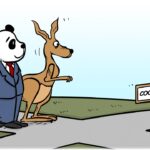China’s top anti-graft authorities has warned diplomatic and foreign affairs officials to be alert against the risk of being infiltrated, subverted, and coaxed into acting corruptly.
“Officials who are on the front line of dealing with foreign affairs, especially the struggle with some hostile forces from the West, their risk of being infiltrated, instigated, and coaxed into corrupt activity is relatively high,” Zhang Jiwen, an official with the Central Commission for Discipline Inspection (CCDI), said in an article published in a recent CCDI magazine.
Zhang pointed out that some units were found to have inadequately implemented the leader’s instructions. There are also risks of lacking forward-thinking, comprehensive planning, and holistic implementation. Zhang also warned of risks of leakage of confidential information, infiltration, and defection.
Some cadres still accept gifts and money from outside parties, engage in unauthorized trips using public funds, and engage in irregular subsidies, Zhang wrote in the article.
Foreign affairs officials are warned of using accumulated foreign affairs resources and connections for personal gain. Some violate regulations covering the use of powers related to foreign exchanges, foreign affairs activity coordination, and approval of friendly cities, and using these powers for personal gain, Zhang said.
There is also the risk of irregular selection and appointment of cadres. A questionnaire survey showed that there is a high level of concern about the risk of “favoritism, making promises for promotion, intervening with recommendations, seeking promotion through connections, and promoting or transferring cadres in a rushed manner” in the selection and appointment of cadres, according to the CCDI article.
Zhang called on officials to adhere to bottom-line thinking and resolutely fight against risks in their line of work.
He emphasized the need to deepen ideological education and improve risk prevention and raise awareness, tighten the institutional framework and build a strong risk prevention and control barriers against those risks.
Detailed measures should be improved to enhance the effectiveness of risk prevention and control, and officials should be supervised so as to improve overall strength of risk prevention.
(Global Times)




